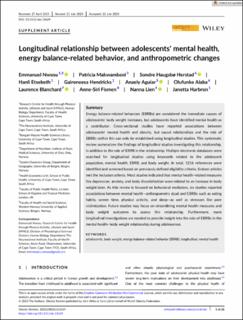| dc.contributor.author | Nwosu, Emmanuel | |
| dc.contributor.author | Makwambeni, Patricia | |
| dc.contributor.author | Herstad, Sondre Haugsbø | |
| dc.contributor.author | Etsebeth, Hanli | |
| dc.contributor.author | Hendricks, Gaironeesa | |
| dc.contributor.author | Aguiar Rodriguez, Anaely | |
| dc.contributor.author | Alaba, Olufunke | |
| dc.contributor.author | Blanchard, Laurence | |
| dc.contributor.author | Fismen, Anne-Siri | |
| dc.contributor.author | Lien, Nanna | |
| dc.contributor.author | Harbron, Janetta | |
| dc.date.accessioned | 2023-12-21T13:03:01Z | |
| dc.date.available | 2023-12-21T13:03:01Z | |
| dc.date.created | 2023-10-11T10:15:54Z | |
| dc.date.issued | 2023 | |
| dc.identifier.issn | 1467-7881 | |
| dc.identifier.uri | https://hdl.handle.net/11250/3108616 | |
| dc.description.abstract | Energy balance-related behaviors (EBRBs) are considered the immediate causes of adolescents' body weight increases, but adolescents have identified mental health as a contributor. Cross-sectional studies have reported associations between adolescents' mental health and obesity, but causal relationships and the role of EBRBs within this can only be established using longitudinal studies. This systematic review summarizes the findings of longitudinal studies investigating this relationship, in addition to the role of EBRB in the relationship. Multiple electronic databases were searched for longitudinal studies using keywords related to the adolescent population, mental health, EBRB, and body weight. In total, 1216 references were identified and screened based on previously defined eligibility criteria. Sixteen articles met the inclusion criteria. Most studies indicated that mental health-related measures like depression, anxiety, and body dissatisfaction were related to an increase in body weight later. As this review is focused on behavioral mediators, six studies reported associations between mental health—anthropometry dyad and EBRBs such as eating habits, screen time, physical activity, and sleep—as well as stressors like peer victimization. Future studies may focus on streamlining mental health measures and body weight outcomes to assess this relationship. Furthermore, more longitudinal investigations are needed to provide insight into the role of EBRBs in the mental health–body weight relationship during adolescence. | en_US |
| dc.language.iso | eng | en_US |
| dc.publisher | Wiley | en_US |
| dc.rights | Navngivelse-Ikkekommersiell 4.0 Internasjonal | * |
| dc.rights.uri | http://creativecommons.org/licenses/by-nc/4.0/deed.no | * |
| dc.title | Longitudinal relationship between adolescents' mental health, energy balance-related behavior, and anthropometric changes | en_US |
| dc.type | Journal article | en_US |
| dc.type | Peer reviewed | en_US |
| dc.description.version | publishedVersion | en_US |
| dc.rights.holder | Copyright 2023 The Author(s) | en_US |
| dc.source.articlenumber | e13629 | en_US |
| cristin.ispublished | true | |
| cristin.fulltext | original | |
| cristin.qualitycode | 1 | |
| dc.identifier.doi | 10.1111/obr.13629 | |
| dc.identifier.cristin | 2183617 | |
| dc.source.journal | Obesity Reviews | en_US |
| dc.identifier.citation | Obesity Reviews. 2023, 24 (2), e13629. | en_US |
| dc.source.volume | 24 | en_US |
| dc.source.issue | 2 | en_US |

